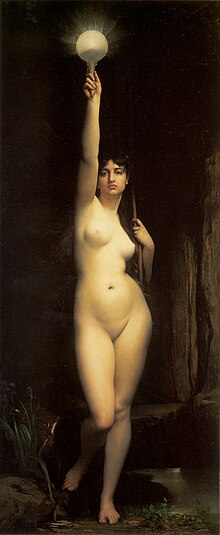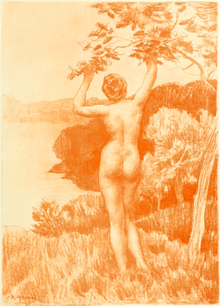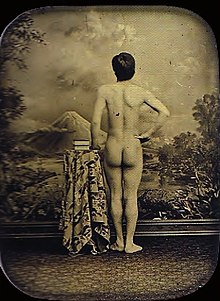Nudity
state of wearing no clothing
(Redirected from Naked (film))
Nudity is the state of being in which a human is without clothing or specifically not covering the genitals. Partial nudity may be defined as not covering other parts of the body deemed sexual. Nudity is culturally complex due to meanings given various states of undress in differing social situations. In any particular society, these meanings are defined in relation to being properly dressed, not in relation to the specific body parts being exposed. Nakedness and clothing are connected to many cultural categories such as identity, privacy, social status and moral behavior. Although often used interchangeably, "naked" and "nude" are also used in English to distinguish between the various meanings of being unclothed.




Quotes
edit- Any excuse is good to... get naked.
- I'm so comfortable with nudity, it's difficult for me to keep my clothes on in just my own everyday life. As soon as I walk in the door when I come home, off go the clothes.
- Marliece Andrada, Marliece Andrada Interview 1998
- The streaking syndrome started a new feeling about freeing the body.
- Suzy Chaffee, Suzy Chaffee: The liberated beauty, The Beaver County Times (17 March 1975)
- Do you wish to honor the Body of the Savior? Do not despise it when it is naked. Do not honor it in church with silk vestments while outside it is naked and numb with cold. He who said, “This is my body,” and made it so by his word, is the same that said, “You saw me hungry and you gave me no food. As you did it not to the least of these, you did it not to me.” Honor him then by sharing your property with the poor. For what God needs is not golden chalices but golden souls.
- To me the the coolest thing about having a boyfriend is that you can just stare at his naked body and not have to look away out of politeness. I find the male form so fascinating. I have a few [favorite body parts]. I like that kind of dent [pelvic bone], that V. And I love [men's] butts. There's nothing better than a good butt.
- Dana Delany, as quoted in movieline.com Movieline (1 August 1994)
- I think male nudity is wonderful.
- Sandra Dee, The Palm Beach Post (5 October 1972)
- My parents were free about nudity, and we are too. I’d like our children to feel unashamed of whatever shape they are. People should worry about other things
- Heidi Klum, InStyle (September 2007)
- I thoroughly enjoy seeing a beautifully proportioned nude male. So did Michelangelo and Rodin. But if the male is blubbery, he should keep his beer barrel to himself and not be a portly polluter.
- June Lockhart, The Palm Beach Post (5 October 1972)
- If people were meant to run around naked, they wouldn't have been born wearing clothes.
- Reverend Loveshade as quoted in Ek-sen-trik-kuh Discordia: The Tales of Shamlicht edited by Reverend Loveshade
- The more a society requires its respectable women to keep their bodies covered, the more likely those women are to be oppressed.
- Eristotle in Ek-sen-trik-kuh Discordia: The Tales of Shamlicht
- A man who can't eat dinner naked on a leather couch is little better than a slave.
- Josh Ozersky, Eat Like a Man (29 April 2013)
- In fact, research suggests that children who have seen their parents nude do not grow up to be emotionally scarred, but instead are more likely to be accepting of their own bodies and comfortable with their own sexuality.
- Holly Robinson, parents.com
- Perhaps the dissenters believe that 'offense to others' ought to be the only reason for restricting nudity in public places generally. [...] The purpose of Indiana's nudity law would be violated, I think, if 60,000 fully consenting adults crowded into the Hoosierdome to display their genitals to one another, even if there were not an offended innocent in the crowd.
- Antonin Scalia, in Barnes v. Glen Theatre, Inc. (1991)
- As one Tatler critic recognised when praising Henry Scott Tuke as 'par excellence the painter of youth', the depiction of naked youths bathing or sitting on Cornish beaches looking contemplatively out to sea played an important part in Tuke's artistic success. However, these paintings elicted a range of different readings and conflicting interpretations from Tuke's viewers, some of which detected a sexualized approach on the artist's part to the unclothed adolescent male body, while many others did not.
- Andrew Stephenson (contributing author), Henry Scott Tuke (New Haven: Yale University Press) by Cicely Robinson (editor), p. 75
- By examining the physical attributes, poses and symbolisms of the naked youths that modelled for Tuke and were depicted in his key works, I argue that certain iconographic differences and pictoral correspondences were familiar to some of Tuke's viewers. This would have been due to their knowledge of classical precedents for representing the youthful male nude and through their exposure to erotic photographic images of naked youths in the open air that encouraged them to infer sexual intent. Yet for other audience, these sexualised associations remained elusive, as they approached the subject of youthful male nudes in landscape settings differently through the conventions of English pastoralism or by seeing the work as making reference to an updated visual language of neoclassicism gaining currency and critical support in British art from the 1860s onwards.
- Andrew Stephenson (contributing author), Henry Scott Tuke (New Haven: Yale University Press) by Cicely Robinson (editor), p. 75
- However, other audiences encountering these works at the Royal Academy or in artists' shows, museums and commercial galleries saw Tuke's paintings with their sensually appealing surfaces, heightened chromatism and delicate handling as suggestive and evocative, but not illicit or sexually provocative. Consequently, they did not question Tuke's reasons for painting naked male adolescents bathing or sitting on the Cornish seashore or at sea. Nor did they see the manner in which male nudes were painted and the fascination with the sensual effects of sunlight on youthful pale flesh as anything other than a licit engagement on the artist's part with a legitimate modern subject. Moreover, as audiences for modern art expanded in the latter part of the nineteenth century, making the most of the greater opportunities in exhibitions, art galleries and museums to see it first hand, so the volume of biographical literature and critical writing on artists' lives exploded and press interviews with living artists offered new ways of evaluating not only their approaches and intentions, but their lifestyles and public images.
- Andrew Stephenson (contributing author), Henry Scott Tuke (New Haven: Yale University Press) by Cicely Robinson (editor), p. 76
- Tuke's interview [in 1895 with The Studio magazine] weaves together many strands of his artistic and aesthetic credo: a commitment to working en plein air in front of the model posed in nature, his dedication to painting by the seaside away from the confinement of the studio, and his resolve to retain 'the outdoor impression' even when working afterwards in the studio. Since Tuke specialised in depicting male nudes, most often adolescents alone or in groups outdoors, The Studio interviewer, like its readers, was particularly interested in the exact nature of Tuke's fascination with naked young boys depicted swimming, sailing or on Cornish beaches, and his attraction to the sensual effect of light on young flesh- questions that Tuke tactfully avoided.
- Andrew Stephenson (contributing author), Henry Scott Tuke (New Haven: Yale University Press) by Cicely Robinson (editor), p. 76
- The fear that seeing naked people in some way harms children is not supported, however, by academic research. The small handful of studies on this topic in psychology and sociology have shown, instead, that children reared in an atmosphere containing family social nudity may benefit from the practice. If this is true, then proposed laws outlawing either social nudity in the home or children's participation at naturist (or nudist) settings are unjustified.
- Yet, the truth is that nudity in the home, when handled in a respectful, matter-of-fact way, is perfectly natural and certainly not harmful.
- Dennis Sugrue, PhD, clinical associate professor of psychiatry at the University of Michigan Medical School in Sex Matters for Women (2002)
- I honestly don't understand the big fuss made over nudity and sex in films. It's silly. On TV, the children can watch people murdering each other, which is a very unnatural thing, but they can't watch two people in the very natural process of making love. Now, really, that doesn't make any sense, does it?
- Sharon Tate as quoted in Sharon Tate and the Manson Murders (2000) by Greg King
- Going to have you naked, by the end of this song!
- Justin Timberlake, "Rock Your Body" (2002), Justified
- Full nakedness! All joys are due to thee,
As souls unbodied, bodies uncloth’d must be,
To taste whole joys. Gems which you women use
Are like Atlanta’s balls, cast in men’s views,
That when a fool’s eye lighteth on a Gem,
His earthly soul may covet theirs, not them.
Like pictures, or like books’ gay coverings made
For lay-men, are all women thus array’d;
Themselves are mystic books, which only we
(Whom their imputed grace will dignify)
Must see reveal’d. Then since that I may know;
As liberally, as to a Midwife, shew
Thy self: cast all, yea, this white linen hence,
There is no penance due to innocence.
To teach thee, I am naked first; why then
What needst thou have more covering than a man.- John Donne, "To His Mistress Going to Bed"
- Crawford: One day my girlfriend, her boyfriend and I were sunbathing topless because that's Barabados - you can wear nothing if you want. And the Pepsi guy walks up and with my agent to meet us for lunch. I wondered if I should put on my top because I have a business relationship with him. I didn't want him to get offended because the rest of the beach had seen me with my top off. Meanwhile as he's walking towards me, he's saying to my agent "I hope she puts on her top." He wasn't even being a schmuck, like wanting to see. He wanted to keep our relationship professional.
- Playboy: Did you or didn't you?
- Crawford: I left it off and it was fine with everyone.
- Cindy Crawford, Playboy Interview: Cindy Crawford Playboy (September 1995)
Dialogue
edit- Police Inspector: So your daddy takes his clothes off in front of you, does he?
- Nathan: When he's rehearsing.
- Anna: What is it about men and nudity? Particularly breasts? How can you be so interested in them?
- William: Well...
- Anna: I mean seriously: they're just breasts. Every second person has them. They're odd looking, they're for milk from your mother. What's all the fuss about?
- Judy: Oh, thank you so much, I'd appreciate that more than you can imagine, it'd be such a- OHHHHH! You are naked!
- Yax: Huh? Oh, for sure! We're a naturalist club!
- Nick: Yeah. "In Zootopia, anyone can be anything." And these guys? They be naked.